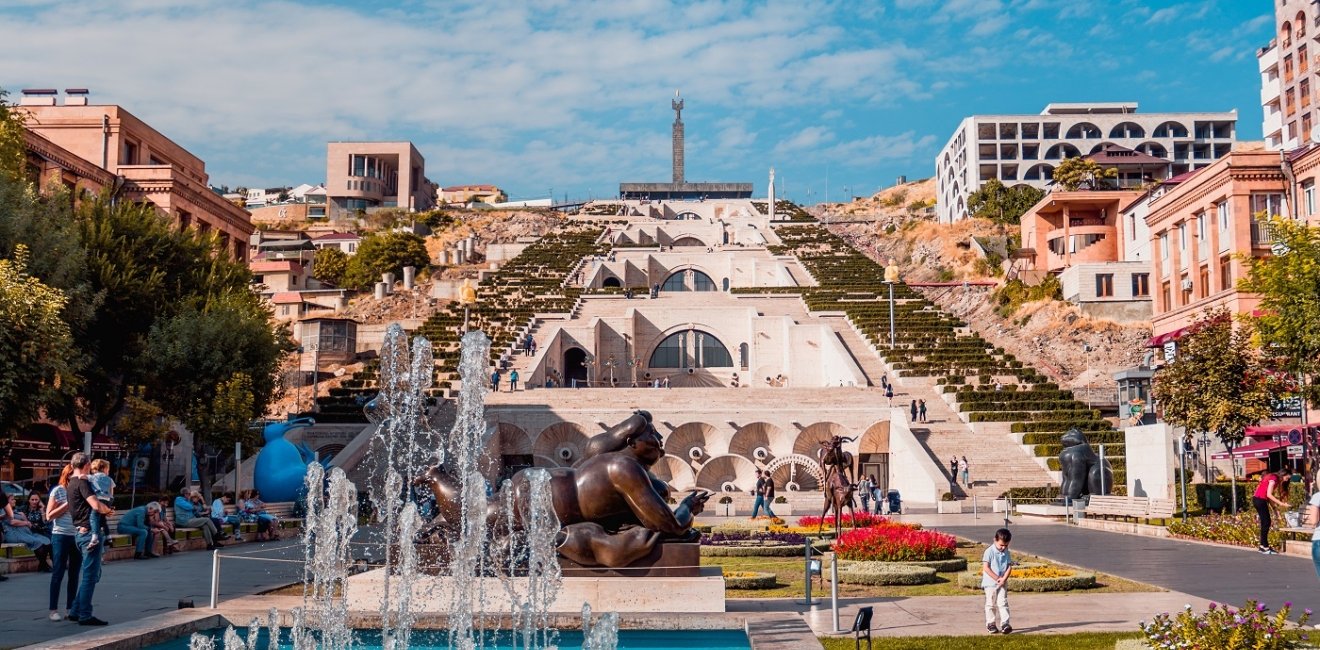
A blog of the Kennan Institute
BY EKATERINA KRONGAUZ
In Moscow, Kristina was an Armenian without Russian citizenship, with no possibility to open a bank account or work legally. In Yerevan, Nastya does not have a bank account or Armenian citizenship. In this couple, one is always an illegal resident.
Kristina was born in Yerevan, but the family soon moved to Luhansk, Ukraine. In 1997, when Kristina was six years old, her father, a businessman, came home and said that they should “leave today.” Something had happened to his business partners, and half a day later, with only the bare necessities packed, the family left Luhansk in a truck, took a series of trains, and got to Yerevan.
In 1997, many houses in Yerevan had no electricity or running water. Kristina calls this period of her life the “cold years.” Pipes and batteries were cut off and sold for scrap. After a year and a half, her father took the family to Moscow.
Kristina understands Armenian, but her native language is Russian. She went to school in Moscow, but, absent citizenship, she could not get into the college of her choice, medical school. She trained as a hairdresser and married an Armenian who had a Russian citizenship. She gave birth to a son, Mark, and began her naturalization process in Russia. But a few years ago, before her divorce, it turned out that Kristina’s husband’s Russian citizenship had been revoked and she and her son could no longer become naturalized. She stayed on in Moscow as an illegal immigrant.
If the beauty salon where Kristina worked had offered her an official contract, everything would have been simple, but her employers didn’t want to bother with taxes. They paid Kristina in cash in an envelope, without a contract, which meant that she could not legalize her stay. She and her son lived with her parents, and she worked as a hairdresser specializing in curly hair and teaching professional courses.
That’s how, in the fall of 2021, she met 35-year-old Nastya.

For her entire life, Nastya dreamed of leaving for some other shore. In her youth, she made an attempt to emigrate to Israel, but that didn’t work. She then decided to make some money and go to Canada, where her sister lived with her wife and three children. That didn’t work out either.
In the fall of 2021, Nastya, who worked as a social project manager, decided to completely change her life. She broke up with a girlfriend, rented a small apartment, bought a car, borrowed money from friends, and went to hairdressing courses for curly hair, which were taught by Kristina.
At the end of February, Nastya, Kristina, and Mark decided to take a couple of days off and rented a house in Moscow’s suburbs. On one of those mornings, Kristina woke up to Nastya’s words: “Kristina, get up. It seems that the war has begun.”
Nastya immediately subscribed to chats about moving to Georgia and, for some reason, to a Facebook group “Our Paraguay.” Meanwhile, it turned that Kristina’s Armenian passport was about to expire. She had to get a new one or she would not be able to move anywhere.
“I was afraid that I would be stuck in this country,” Kristina tells me. Then, one day, someone called from her son’s school and said that the lessons were canceled because a bomb was planted in the school. The bomb turned out to have been a scare, but Mark's phone had died and “I nearly lost my mind until he returned home,” she said. “I realized that I was scared all the time. You can’t live like that.”
Kristina’s parents were against her departure. Her sister unexpectedly took a pro-Russian stance, and her mom blamed “Ukrainian Nazis” for the war. Mark blamed Putin, and Kristina was afraid that he would repeat this at school and get into trouble. In the end, Kristina and Nastya decided to move to Yerevan, as the simplest and cheapest solution.
It took three attempts for them to get the tickets. First, the airports got closed, then the low-cost carrier they hoped to fly with stopped operating. Having lost several thousand dollars out of $5,000 they had had between them, Kristina and Nastya finally made it to Yerevan. Kristina’s sister and mother never understood why Kristina left.
From the moment they arrived, Nastya and Kristina decided that they would start working as hairdressers. But renting a chair at a salon turned out to be an unusual practice in Yerevan. They started working from home. “I am one of those [people] who always thought that working at home is unseemly somehow,” says Kristina, with a laugh. “Now I put people on their knees in my bathroom to wash their hair!”
A Russian citizen can stay in Armenia for 180 days a year, after which he or she needs to leave and re-enter. One is fined 10,000 rubles (about $150) if one overstays. But Yerevan is not this couple’s final destination. The problem is, Kristina and Nastya have not yet agreed on where to go next. They’ve known each other for half a year and are already having to make such complex decisions together.
Kristina recently came out to her sister, who lives in America. She reacted calmly to the news. But Kristina is not ready to come out to her parents or her other sister yet. Mark still believes Kristina and Nastya are just friends. “We don’t demonstrate anything in public,” says Nastya. “Everything is prohibited here. The girl who ran a gay club here had to leave.”
In Yerevan, as well as in Moscow, there are protests and rallies. “At first, I thought it was some kind of open-air picnic. Here in the protest tent city everyone drinks, dances, and barbecues. I remember the feeling in Moscow: every time you walk past a policeman you shrink. That’s not the case here,” Kristina says. Nastya clarifies: “The fact is, we don’t know local alignments. We just don’t understand the local situation.”
Nastya doesn’t think she has reached her final destination. She is saving money again, for further emigration. She thinks and thinks, makes a decision, then reverses it and scolds herself. She feels she didn’t have enough guts to leave on her own, that she was “squeezed” out of Russia “like toothpaste from a tube.” She is frustrated with herself: “How long can one keep saying that one will leave and never leave anyway!”
“But you left, didn’t you?” Kristina asks. “To Armenia?! This doesn’t count,” says Nastya.
The opinions expressed in this article are those solely of the authors and do not reflect the views of the Kennan Institute.
Author

Independent Journalist

Kennan Institute
After more than 50 years as a vital part of the Wilson Center legacy, the Kennan Institute has become an independent think tank. You can find the current website for the Kennan Institute at kennaninstitute.org. Please look for future announcements about partnership activities between the Wilson Center and the Kennan Institute at Wilson Center Press Room. The Kennan Institute is the premier US center for advanced research on Eurasia and the oldest and largest regional program at the Woodrow Wilson International Center for Scholars. The Kennan Institute is committed to improving American understanding of Russia, Ukraine, Central Asia, the South Caucasus, and the surrounding region through research and exchange. Read more

Explore More in The Russia File
Browse The Russia File
Chechnya as a Model of Modern Russia

Russia’s Indigenous Communities and the War in Ukraine

Gas and Power in a Changing US–Russia Relationship

